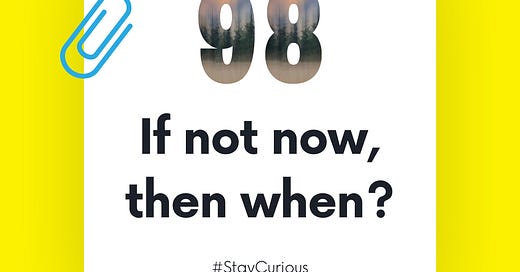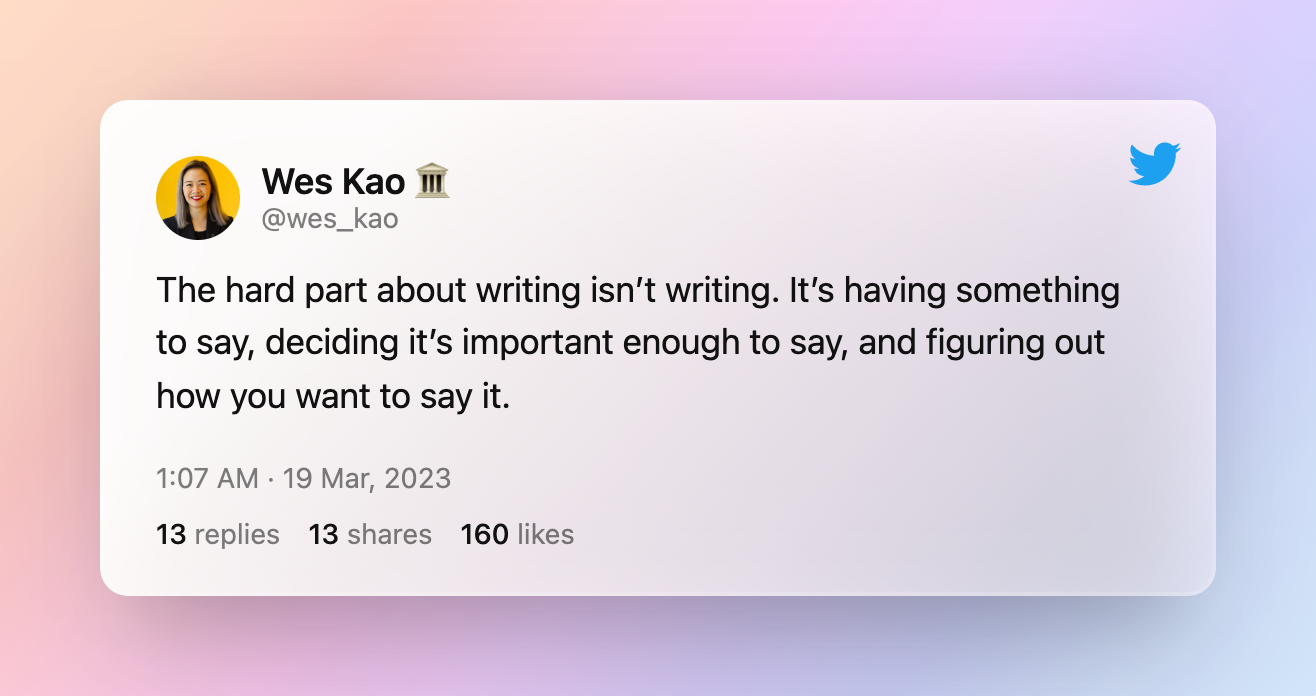#98 Budgets are a tool, not a weapon.
Lessons from Munger, Andreessen, Casey Winters & Ted Lasso
Kevin Kelly suggests:
Separate the processes of creating from improving. You can’t write and edit, or sculpt and polish, or make and analyze at the same time. If you do, the editor stops the creator. While you write the first draft, don’t let the judgy editor get near. At the start, the creator mind must be unleashed from judgment.
This is based on his life’s learning (this and some more will be part of this upcoming book titled “Excellent advice for living: Wisdom I wish I'd known earlier”). Thanks Startupy for surfacing this one.
Any great art work needs both the phases - creating and improving. Those who can do this both are lucky and are more likely to create meaningful outcomes. How do you keep the two phases separate? It’s a skill that needs to be honed with experience. Iteration may be one way to approach it. Whenever I have tried to write anything, every successive pass has done magic in making the outcome better.
Do you know any other way?
I’ve a limited set to share today, let’s get to that quickly.
1. Psychology of Entrepreneurial Misjudgment
In his seminal post from 2008, Marc Andreessen referenced lessons from Charlie Munger’s “The Psychology of Human Misjudgment” speech and adapted them for the modern entrepreneur.
It’s a good read, grounded in actionable inputs. You would not expect anything less from these two gents, would you?
2. Founder Intuition vs. Team Expertise
Casey Winter shares a very important insight on how the contribution of a founder evolves in the journey of a company. Here’s a snippet worth noting:
Great founders start to back away from relying on founder intuition when they see the expertise developing on the team, or are proven wrong in a meaningful way by the team that makes them start to question their often blind faith in their own judgment. Moving forward, founders have to calibrate how their intuition stacks up against team expertise on every topic of the business to know how much to intervene vs. let the team drive.
He extends this idea further to team expertise vs customer expertise. Quite relatable when you look at the journey of great products. Somewhere customer expertise can take us only to a certain milestone, the journey ahead is built on someone’s ‘product sense’ or intuition.
3. Greatness
Andrew Knowlton of Bon Appétit profiled Hillstone to highlight why he thinks it as America's favorite restaurant. And that distinction is not an easy one, given he is referring to Hillstone as in the chain of restaurants (48 restaurants in 15 names in 15 states).
The post does not talk about 5 great things that Hillstone does. It talks of a philosophy and operating culture that is built for greatness. Hillstone’s success is an outcome of attention to details. The post surfaces those tiny little ‘Hillstone things’ in every other paragraph. I cannot tell you more; experience it in Andrew’s writing style - you will know why I loved this one.
(via Startupy newsletter)
4. Ted Lasso & Some lessons in “Show, Don’t Tell”
Ted Lasso is back, and in style. I loved the first episode of season 3. The whole sequence with the London sewer system is unbelievable. Only Coach Lasso can pull off something like that. Watch the episode, you won’t be disappointed.
If you’re not into Ted Lasso yet, here’s a beautiful post by Trung Phan summarizing how the show’s pilot did a fabulous job of “show, don’t tell” in introducing Coach Lasso in just 157 seconds. I’m sure you’ll be intrigued to give this show a shot.
#LittleMomentsOfJoy
5. Everything else
Some random goodness from the internet:
Street Photo International (@streetphotographyinternational)’s feed is a eye candy and waiting to shout so many interesting stories (via Dense Discovery)
"Becoming Trader Joe" is on my wishlist now. Jitha’s blog had a good summary on key lessons from the Trader Joe story.
The playful design details of the Playdate console. Lucky are those designers who get to work on such projects. Such products are the output of many difficult choices, what a learning experience it would be to make anything as beautiful.
Simple techniques for complex projects. Seth Godin at his usual best.
Title of today’s post was taken from Seth’s post.
Before we sign off, here’s a gentle reminder to myself (and to you all).
That's all for this week, folks!
I hope I've earned the privilege of your time.
If you enjoyed this post, show your love by commenting and liking it. I write this newsletter to share what I learnt from others. If you learnt something from this today, why not share it with a couple of your friends to continue this chain?




